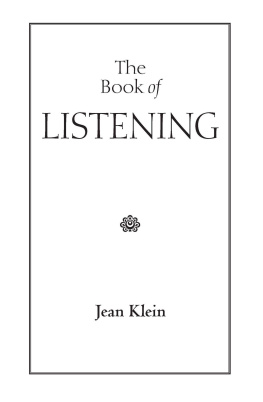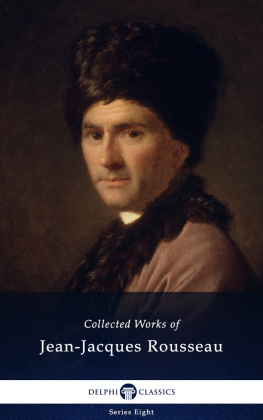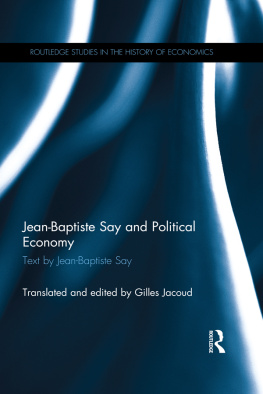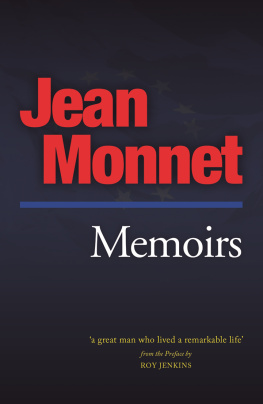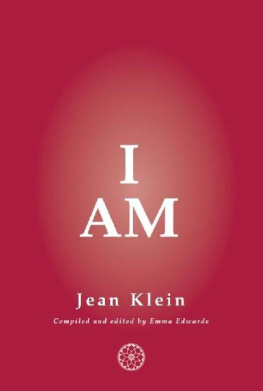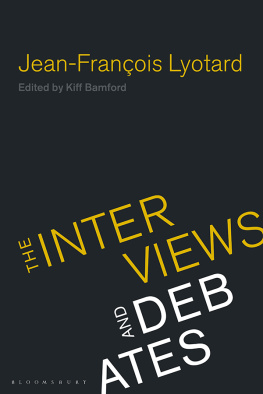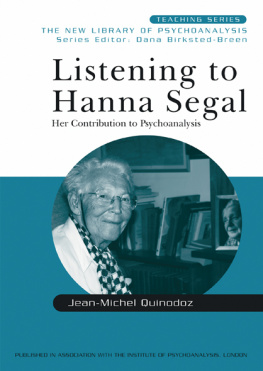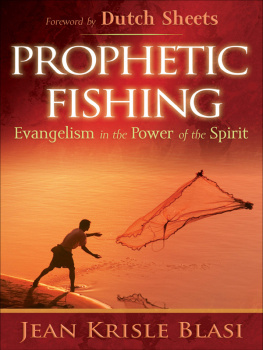
OTHER WORKS BY JEAN KLEIN
Be Who You Are
Who Am I?
Beyond Knowledge
Living Truth
I Am
Open to the Unknown
Transmission of the Flame
The Ease Of Being
In Spanish
Quien Soy Yo?
Translations also available in French, Italian, German and Chinese
First published November 2008 by Non-Duality Press
Emma Edwards 2008, 2013
Non-Duality Press 2008, 2013
All rights reserved. No part of this publication may be reproduced or transmitted in any form or by any means, electronic or mechanical, including photocopying, recording or by any information or retrieval system without written permission by the publisher, except for the inclusion of brief quotations in a review.
Non-Duality Press, PO Box 2228
Salisbury, SP2 2GZ
United Kingdom

eISBN: 978-0-9553999-4-7
www.non-dualitybooks.org
Acknowledgements
With deep gratitude to Mary Dresser for her invaluable contributions to the preparation of the original journals as well as her assistance in editing this compilation, and to Nancy Moshe who designed and oversaw the printing of the original issues. Thanks also to Philip Goldsmith for encouraging the publication of the journals in book form and for his useful comments, and to all those who have been of assistance along the way.
Introduction
This book is a compilation of Volumes 1 10 of Jean Klein's journal Listening , published on a limited basis between 1989-1995. The articles whose sources are not otherwise identified, are based on private conversations with Jean Klein usually around a single topic. I made notes as we talked, occasionally recording the conversations, and sometimes, as in the prose poem On Love, the echo of a conversation was later distilled into a few lines.
Each original volume was loosely arranged around a theme and included an original private discussion or a transcription of a public talk with Jean Klein, various favourite articles, one question answered in depth (Your Question) and a brief description from different angles of Jeans unique approach to the role of the body in his teaching.
Most of Jean Kleins teaching was simply through his presence and through question and answer dialogues where he answered the questioner, not the question. Jean emphasised the direct approach to liberation, an approach free from emphasis on the attainment of progressively subtle psycho-somatic states. However, in this book there are ten short chapters dealing with Jean Kleins approach to the body. These will be clear to readers of the original journals who may have attended seminars, but a word of explanation is perhaps needed for the majority of readers.
In conjunction with dialogues Jean offered a unique form of what he called body-work or yoga. This was not taught as a requirement for understanding or realisation, but as a useful tool for getting to know ones conditioning. Our thought processes affect the body and mind and vice versa. The body-work was introduced to help clarify this relationship and bring an awareness that our real nature is neither the body nor the mind. The aim of this yoga was to bring about sensations of relaxation, expansion, light, space and energy which, when noted and welcomed, can deepen understanding of our real nature. This understanding in turn brings about a letting-go in our psycho-somatic structures. Insight and relaxation or letting go can bring about apperception as a total body-mind experience. While the understanding of our real nature is not dependent on anything, for many people Jeans philosophy came to life and light when experienced in this approach to the body.
The blend of mind and body had interested Jean since his early medical and musical studies. He was also an accomplished violinist and as a young adult was a voice coach and choral director. He combined a knowledge of music with his knowledge of the effects of muscle and mental tension on performance. Later he developed this psycho-somatic relationship when he added a Kashmiri style subtle energy yoga to his studies of traditional yoga learned in India with Krishnamacharya.
Jean experienced life free from memory, with an openness and freshness as if every event were new. He greeted old friends as if for the first time and welcomed those he had just met as if they were old friends. He took nothing and no one for granted. He might stop abruptly, taken by the shape of clouds or the play of light or the eyes of a baby or animal. What struck those in his company was how free from preconceptions he was and how he experienced everything as if for the first time and with a sense of exploration like a young child. He had a boundless energy for living and seeing things in a new way and it made his companionship a real joy, no matter the activity. Spending time with him always had the quality of a new experience.
This was all the more impressive considering Jean Kleins complex and often difficult life and his considerable intellect and many talents. He was widely educated and widely travelled and spoke four languages (Czech and German in his youth and French and English in adult life). After his return from a long sojourn in India he was invited to hold meetings in many countries including England, France, Germany, Greece, Israel, Holland, Spain, Switzerland, Tunisia, and the United States. He was not a simple sadhu by any means and yet his presence conveyed utter simplicity.
Jean Klein had a great appreciation and knowledge of the Artspainting, sculpture and poetry in particular. He enjoyed all expressions of beauty, both man-made and natural. Most of all he loved humankind and his adult life was devoted to helping in any way that he was asked and able.
I hope this compilation captures a little of the multi-cultural interests and tastes of this truly remarkable Renaissance man.
E.E.
Table of Contents LISTENING Volume 1
1989 .
The Disciple and the Guru
Jean Klein: Ultimately speaking there is not a guru and not a disciple, no teacher or teaching, because what you are is not teachable. Have you anything to say?
Q. So in what sense can we understand the word disciple?
JK. To be a disciple means to prepare oneself to face the truth. It is a profound need to be one with truth. The preparation is the result of seeing that ones life is dispersed, that it is still meaningless, that one is lost in trying to escape from a meaningless life. When the question, What is the meaning of life? appears in all urgency, when one is ready to give all to this question, then one is a disciple, a disciple of truth, of life.
Q. So there is a clear moment when one is not a disciple and when one is?
JK. Absolutely. When you are a disciple of life all doings refer to the question, to truth. Life may not change outwardly, but there is a feeling of inner orientation, a conviction of the quest.
Q. How can actions refer to the truth when one is not yet established in truth?
JK. The threshold of truth is the absence of calculation, the not-knowing state. All that appears in you refers to this thoughtless ground, your silence. Every object appears and dies in this stillness.
Q. What are the signs for oneself that one is oriented, on the right scent?
JK. You have the inner conviction, from an insight, of the truth. You are free from day-dreaming, free from intention. You are free from compensations. You feel many moments without lack. You are more free from yourself!
Q. Is it necessary, when one is oriented, to have a teacher?
JK. You may need it because you are not yet established. The real disciple who refers all appearings to his openness, to his not-knowing, does not look for anything objective. He knows that truth cannot be found in an object. He lives only in openness, this waiting without waiting for anything. In this not-knowing, the desire may come up to meet one who is established in the openness. But a disciple will never go to see someone from curiosity or to look for a teacher, because he already knows that anything he finds is not the guru.
Next page
